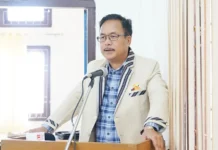Monday Musing
[ Tongam Rina ]
A private member’s resolution titled ‘The Arunachal Pradesh Monogamy Election Eligibility Bill, 2023’ was circulated for discussion during the September 2023 legislative assembly session. The bill proposed that individuals with only one spouse should be eligible to run for elections. In the context of this bill, “one spouse” referred to someone legally married with only one partner. Congress MLA Ninong Ering submitted this resolution, generating considerable interest. The Arunachal Pradesh Women’s Welfare Society, which had been advocating against polygamy for over 40 years, was notably enthusiastic that a male member was introducing such a bill. They even attended the session, hoping for a discussion, but were ultimately disappointed when the resolution never made it to the legislative assembly’s table, despite being circulated among members.
When reporters questioned Chief Minister Pema Khandu about why the bill was not tabled, he placed the blame squarely on the absent member. However, it is my belief, based on years of following legislative assembly proceedings, that the MLA was likely advised not to attend to spare the government embarrassment.
The current form of the bill requires an amendment to the Representation of People’s Act, 1951, by inserting a new subsection, 4 A, in Section 4, which would read as follows: “Notwithstanding anything contained in this section or any other provision of the Act, only candidates with one spouse shall be eligible to contest elections for the state legislative assembly of Arunachal Pradesh.” The bill also aimed to include the Panchayat Act, 1997, and the Municipal Act, 2007, under its jurisdiction.
It’s important to note that the Representation of the People’s Act, 1951, governs the conduct of elections to the House of Parliament and the state legislature, as well as the qualifications and disqualifications for membership. However, the bill faced technical issues since only the Parliament has the authority to amend the Representation of People’s Act, 1951.
Ideally, the MLA should have been allowed to table the bill and initiate a discussion. However, the legislative assembly is not known for discussing pressing social issues or matters relevant to the larger society, with some exceptions.
Currently, there are at least seven members in the legislative assembly with multiple wives, and one female member is a third wife. This number may vary. While this isn’t a large number, the bill might have been passed despite its technical flaws if it had been tabled. This could be one reason why the government wasn’t keen on discussing it.
Additionally, it’s worth noting that, of the nine chief ministers, six have had multiple wives, indicating a wide acceptance and tolerance of polygyny in Arunachali society.
Why is polygyny so prevalent despite being considered a social evil in the state? Early research often romanticised the practice, overlooking its roots in patriarchy. It was once accepted as a means to share labour or produce more children, but in contemporary times, it appears illogical.
Today, polygyny sometimes receives social approval in cases where there are no male heirs.
Many women lacking property and economic opportunities choose to stay in polygynous marriages. In some cases, women encourage polygamy out of fear of abandonment, bringing in relatives as second wives or making household workers co-wives.
Statistics show that polygamy is most common among the Abotani group, which is economically and politically dominant, but it is not exclusive to them. Polygamy is discouraged but socially sanctioned, allowing for various excuses for taking multiple wives, ranging from not being served food to taking care of the family to not having a male child.
Polygamy is not solely a problem for women; it affects families in most cases. Its roots lie in patriarchy, which isn’t disappearing anytime soon due to its many adherents. However, with limited resources and land, polygamy may decrease.
In many societies, polygamy is seen as a lifestyle, but in Arunachal it is a social issue that is often challenging to discuss.
The way forward would be to initiate a discussion on this issue, rather than hiding behind the veil of customary law. Customary laws often perpetuate patriarchy.



